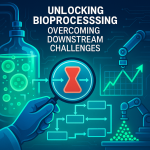🔍 Their new HEK293 qPCR assay detects host-cell DNA, improving product purity.
📊 Future assays will analyze AAV vectors, ensuring quality and efficacy.
💰 This efficiency can significantly reduce production costs and expand patient access.
Introduction:
The article discusses advancements in assay development by Thermo Fisher Scientific aimed at improving the production processes of gene therapies. It highlights the pivotal role that these assays play in ensuring product quality and efficacy, particularly in the context of bioprocessing using human cell lines.
- Assays are essential for monitoring attributes throughout gene therapy production, ensuring purity and effectiveness.
- The HEK293 residual qPCR assay detects host-cell DNA, improving the monitoring of vector purity in gene therapy products.
- Enhancements in assay sensitivity are achieved through careful design and manufacturing processes, focusing on human-derived cell line characteristics.
- Thermo Fisher is developing additional assays related to adeno-associated viruses (AAV) to measure critical metrics like capsid ratios and genome integrity.
- Advancements in assays are vital for lowering production costs and increasing accessibility to gene therapies, which can be prohibitively expensive.
Conclusion:
The article underscores the importance of assay innovation in gene therapy production, which is crucial for enhancing product quality and reducing costs. Continued advancements in this field are necessary to make gene therapies more accessible to patients, ultimately impacting the future of biotherapeutics.



